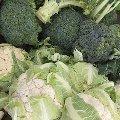Broccoli and Cauliflower – Their Tops Make Good Eating
This is the VOA Special English Agriculture Report.
Some people say broccoli looks like small trees, and cauliflower like gathered clouds. They think broccoli is only green and cauliflower is only white. But these nutritious vegetables also come in more colorful versions. One kind of cauliflower, for example, is orange, and broccoli can be purple.
Broccoli and cauliflower are among the most nutritious vegetables. They are high in Vitamin C, fiber and other nutrients. And they contain substances that are believed to fight cancer. They belong to the cabbage or cole family. Other members include cabbage, collards, Brussels sprouts, kale and kohlrabi.
Agriculture experts at the Ohio State University Extension say broccoli and cauliflower grow best in cooler climates. They suggest planting them where the average daily temperature is between eighteen and twenty-six degrees Celsius.
Both crops grow best in sunshine and fertile, moist soil. But water should not be standing on the soil. Using mulch helps keep the ground moist and cool. Mulch also helps feed the soil and controls weeds. Broccoli and cauliflower can grow outdoors from seed or as small plants. Vincent Fritz of the University of Minnesota Extension suggests that results are far better with small plants. He says the vegetables should be planted so that they can be harvested before the hottest weather.
Experts differ about how to space the plantings in the ground. One suggestion is to plant them in rows about three quarters of a meter to nearly one meter apart.
Then place broccoli plants about twenty to thirty centimeters apart in the rows. Set cauliflower plants thirty-eight to about forty-six centimeters from each other in the rows.
As it grows, a cauliflower plant will start to form a head. The head contains flower buds that are tightly closed and at least two leaves wrapping it. Gather and tie the leaves over the head, and do not wait for the buds to separate before harvesting.
Harvest the center flower-bud cluster of broccoli when it reaches the size you want and while the buds are still tightly together. Cut the main stem about twelve to fifteen centimeters below the head.
You can eat broccoli and cauliflower raw. Or you can steam them in a small amount of water or stir fry them in a small amount of oil. The less time they cook, the better.
And that's the VOA Special English Agriculture Report, written by Jerilyn Watson. I'm Bob Doughty.

